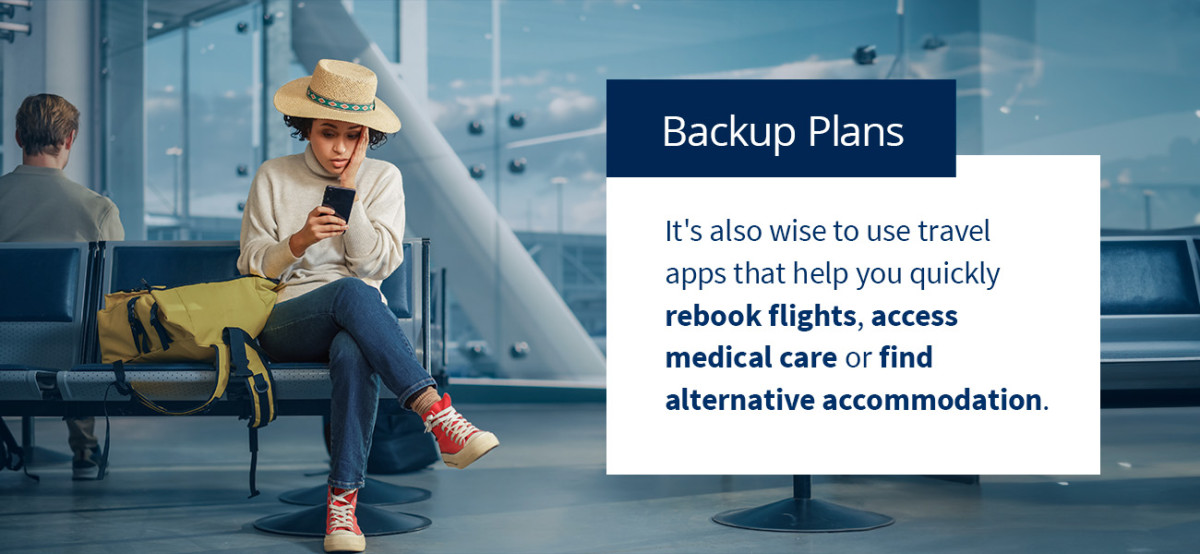Whether you're staying close to home or going to a new country, traveling is an exciting and eye-opening experience. However, curveballs might disrupt your trips.
While you can't predict every difficulty you might encounter, preparing to roll with the punches will reduce stress and allow you to enjoy your vacation with more peace of mind.
Common Unforeseen Circumstances
When you're traveling, there is always a chance of something disrupting your plans and creating challenges. From natural disasters to health emergencies, here are a few situations to consider when planning a vacation.
Travel Disruptions
Flight delays, lost luggage, cancellations and strikes can impact your transportation. Stay up to date on your flight status, keep essentials in your carry-on bag and have contingency plans like backup accommodation or alternative travel routes. Travel insurance may cover additional expenses like meals, replacement items and hotel stays.
Health Emergencies
Sudden illness, injury or a health crisis can impact travel. Get travel insurance that covers medical care abroad. Also, find out where the nearest hospital is so you can get immediate medical attention when needed.
Natural Disasters
Natural disasters like floods, earthquakes, wildfires and hurricanes can be somewhat predictable depending on the weather. For example, if you book a flight during hurricane season, you may face canceled flights and local service disruptions. Follow local news, heed evacuation orders and contact your travel agent or airline for assistance if the weather interferes with your trip.
Strategies for Handling Unpredictability
If you're in a pinch, ask for help from local authorities, your hotel concierge, fellow travelers or airport staff. They can provide valuable resources, especially if you're in an unfamiliar place or need help handling your situation.
Backup Plans
Travel insurance is a crucial strategy for managing unwelcome surprises on vacation. Your policy might reimburse you for canceled flights or lost luggage, potentially covering a portion of your expenses if you suddenly need to cancel your trip. Some policies offer 24-hour emergency assistance, giving you peace of mind when you're off on an adventure.

Always have a plan B when you're traveling, and pack a travel emergency kit with first-aid supplies, snacks, a power bank and extra medication. These can be lifesavers in delays or other disruptions. It's also wise to use travel apps that help you quickly rebook flights, access medical care or find alternative accommodation.
Essential Preparations
You always hope things will go smoothly when exploring a new place, but it happens. Whether it's like 2024's famous Crowdstrike incident that skewed most travelers' plans or an uncomfortable situation, it's wise to prepare. Follow these tips to get ready for your trip and any emergencies you may find yourself in.
- Research: Research your destination and travel route in-depth, noting safer areas and what numbers to call in an emergency. For more updates, sign up for the Smart Traveler Enrollment Program, which shows you the nearest United States embassy or consulate.
- Blend in: You may be more vulnerable to crime if you look like a tourist. Dress like the locals and be discreet when looking at directions. You can also invest in protective clothing to make it difficult for pickpockets to steal from you.
- Copy essential documents: Make copies of documents like your passport or driver's license.
- Stay in touch: Update friends or family on your progress and whereabouts, and share a copy of your itinerary so they can monitor your progress.
- Get an eSIM: Avoid public Wi-Fi, which increases your vulnerability to hackers. Invest in a digital or embedded SIM card and use your data for better mobile safety.
Frequently Asked Questions
Read on to learn how to maximize your travels and enjoy your vacation to the fullest while protecting yourself and your loved ones.
How Can You Stay Safe While Traveling?
Follow our tips on blending in, staying informed about your surroundings and staying connected with friends or family. Also, opt for a reputable transportation system or rideshare app and avoid traveling alone at night.
Should You Buy Travel Insurance?
Travel insurance is a wise investment that can cover various unexpected events. Without insurance, you risk significant financial loss if an emergency disrupts your travels.
How Do You Protect Yourself When Traveling?
You can use anti-theft bags to keep your money and passport safe. Protect your health by drinking bottled water, eating at reputable restaurants and sanitizing your hands regularly.
Meeting new people is part of the travel experience, but exercise caution. Avoid sharing private information and trust your gut feeling when spending time with anyone you don't know well.
What Are Some Post-Crisis Recovery Tips?
Recovering from a crisis can be challenging. Whether you're mid-trip or back home, follow these tips:
- If you're sick or injured, get medical attention immediately.
- Contact your friends or family for help or to talk things through.
- Assess your situation and decide whether you need to change your itinerary or go home.
- File your insurance claims, providing all receipts, boarding passes, medical records and police records where applicable.
- Take care of your mental health with professional support.
- Focus on the positives and reminisce about the good time you had despite all the challenges.
Prepare for Unexpected Travel Situations With AAA Central Penn
Preparation is essential for an enjoyable vacation. Stay calm and be flexible, whatever life throws your way.
Sign up for one of AAA Central Penn's travel insurance packages and adventure with peace of mind, knowing you have protection if something goes wrong. You can also ask our experienced AAA Travel Advisors to help you plan the perfect getaway.
AAA Travel works with Allianz Global Assistance to offer our members various travel insurance options. Get your quote today and start packing.


